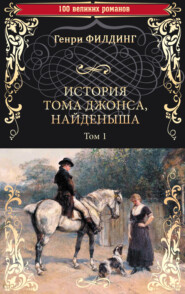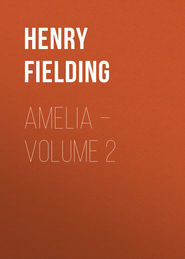По всем вопросам обращайтесь на: info@litportal.ru
(©) 2003-2024.
✖
The Works of Henry Fielding, vol. 11
Настройки чтения
Размер шрифта
Высота строк
Поля
Sunday, July 19.– This morning early I summoned Mrs Francis, in order to pay her the preceding day’s account. As I could recollect only two or three articles I thought there was no necessity of pen and ink. In a single instance only we had exceeded what the law allows gratis to a foot-soldier on his march, viz., vinegar, salt, &c., and dressing his meat. I found, however, I was mistaken in my calculation; for when the good woman attended with her bill it contained as follows: —
Now that five people and two servants should live a day and night at a public-house for so small a sum will appear incredible to any person in London above the degree of a chimney-sweeper; but more astonishing will it seem that these people should remain so long at such a house without tasting any other delicacy than bread, small beer, a teacupfull of milk called cream, a glass of rum converted into punch by their own materials, and one bottle of wind, of which we only tasted a single glass, though possibly, indeed, our servants drank the remainder of the bottle.
This wind is a liquor of English manufacture, and its flavour is thought very delicious by the generality of the English, who drink it in great quantities. Every seventh year is thought to produce as much as the other six. It is then drank so plentifully that the whole nation are in a manner intoxicated by it; and consequently very little business is carried on at that season.
It resembles in colour the red wine which is imported from Portugal, as it doth in its intoxicating quality; hence, and from this agreement in the orthography, the one is often confounded with the other, though both are seldom esteemed by the same person. It is to be had in every parish of the kingdom, and a pretty large quantity is consumed in the metropolis, where several taverns are set apart solely for the vendition of this liquor, the masters never dealing in any other.
The disagreement in our computation produced some small remonstrance to Mrs Francis on my side; but this received an immediate answer: “She scorned to overcharge gentlemen; her house had been always frequented by the very best gentry of the island; and she had never had a bill found fault with in her life, though she had lived upwards of forty years in the house, and within that time the greatest gentry in Hampshire had been at it; and that lawyer Willis never went to any other when he came to those parts. That for her part she did not get her livelihood by travellers, who were gone and away, and she never expected to see them more, but that her neighbours might come again; wherefore, to be sure, they had the only right to complain.”
She was proceeding thus, and from her volubility of tongue seemed likely to stretch the discourse to an immoderate length, when I suddenly cut all short by paying the bill.
This morning our ladies went to church, more, I fear, from curiosity than religion; they were attended by the captain in a most military attire, with his cockade in his hat and his sword by his side. So unusual an appearance in this little chapel drew the attention of all present, and probably disconcerted the women, who were in dishabille, and wished themselves drest, for the sake of the curate, who was the greatest of their beholders.
While I was left alone I received a visit from Mr Francis himself, who was much more considerable as a farmer than as an inn-holder. Indeed, he left the latter entirely to the care of his wife, and he acted wisely, I believe, in so doing.
As nothing more remarkable past on this day I will close it with the account of these two characters, as far as a few days’ residence could inform me of them. If they should appear as new to the reader as they did to me, he will not be displeased at finding them here.
This amiable couple seemed to border hard on their grand climacteric; nor indeed were they shy of owning enough to fix their ages within a year or two of that time. They appeared to be rather proud of having employed their time well than ashamed of having lived so long; the only reason which I could ever assign why some fine ladies, and fine gentlemen too, should desire to be thought younger than they really are by the contemporaries of their grandchildren. Some, indeed, who too hastily credit appearances, might doubt whether they had made so good a use of their time as I would insinuate, since there was no appearance of anything but poverty, want, and wretchedness, about their house; nor could they produce anything to a customer in exchange for his money but a few bottles of wind, and spirituous liquors, and some very bad ale, to drink; with rusty bacon and worse cheese to eat. But then it should be considered, on the other side, that whatever they received was almost as entirely clear profit as the blessing of a wreck itself; such an inn being the very reverse of a coffee-house; for here you can neither sit for nothing nor have anything for your money.
Again, as many marks of want abounded everywhere, so were the marks of antiquity visible. Scarce anything was to be seen which had not some scar upon it, made by the hand of Time; not an utensil, it was manifest, had been purchased within a dozen years last past; so that whatever money had come into the house during that period at least must have remained in it, unless it had been sent abroad for food, or other perishable commodities; but these were supplied by a small portion of the fruits of the farm, in which the farmer allowed he had a very good bargain. In fact, it is inconceivable what sums may be collected by starving only, and how easy it is for a man to die rich if he will but be contented to live miserable.
Nor is there in this kind of starving anything so terrible as some apprehend. It neither wastes a man’s flesh nor robs him of his chearfulness. The famous Cornaro’s case well proves the contrary; and so did farmer Francis, who was of a round stature, had a plump round face, with a kind of smile on it, and seemed to borrow an air of wretchedness rather from his coat’s age than from his own.
The truth is, there is a certain diet which emaciates men more than any possible degree of abstinence; though I do not remember to have seen any caution against it, either in Cheney, Arbuthnot, or in any other modern writer or regimen. Nay, the very name is not, I believe, in the learned Dr James’s Dictionary; all which is the more extraordinary as it is a very common food in this kingdom, and the college themselves were not long since very liberally entertained with it by the present attorney and other eminent lawyers in Lincoln’s-inn-hall, and were all made horribly sick by it.
But though it should not be found among our English physical writers, we may be assured of meeting with it among the Greeks; for nothing considerable in nature escapes their notice, though many things considerable in them, it is to be feared, have escaped the notice of their readers. The Greeks, then, to all such as feed too voraciously on this diet, give the name of Heautofagi, which our physicians will, I suppose, translate men that eat themselves.
As nothing is so destructive to the body as this kind of food, so nothing is so plentiful and cheap; but it was perhaps the only cheap thing the farmer disliked. Probably living much on fish might produce this disgust; for Diodorus Siculus attributes the same aversion in a people of Æthiopia to the same cause; he calls them the fish-eaters, and asserts that they cannot be brought to eat a single meal with the Heautofagi by any persuasion, threat, or violence whatever, not even though they should kill their children before their faces.
What hath puzzled our physicians, and prevented them from setting this matter in the clearest light, is possibly one simple mistake, arising from a very excusable ignorance; that the passions of men are capable of swallowing food as well as their appetites; that the former, in feeding, resemble the state of those animals who chew the cud; and therefore, such men, in some sense, may be said to prey on themselves, and as it were to devour their own entrails. And hence ensues a meagre aspect and thin habit of body, as surely as from what is called a consumption.
Our farmer was one of these. He had no more passion than an Ichthuofagus or Æthiopian fisher. He wished not for anything, thought not of anything; indeed, he scarce did anything or said anything. Here I cannot be understood strictly; for then I must describe a nonentity, whereas I would rob him of nothing but that free agency which is the cause of all the corruption and of all the misery of human nature. No man, indeed, ever did more than the farmer, for he was an absolute slave to labour all the week; but in truth, as my sagacious reader must have at first apprehended, when I said he resigned the care of the house to his wife, I meant more than I then expressed, even the house and all that belonged to it; for he was really a farmer only under the direction of his wife. In a word, so composed, so serene, so placid a countenance, I never saw; and he satisfied himself by answering to every question he was asked, “I don’t know anything about it, sir; I leaves all that to my wife.”
Now, as a couple of this kind would, like two vessels of oil, have made no composition in life, and for want of all savour must have palled every taste; nature or fortune, or both of them, took care to provide a proper quantity of acid in the materials that formed the wife, and to render her a perfect helpmate for so tranquil a husband. She abounded in whatsoever he was defective; that is to say, in almost everything. She was indeed as vinegar to oil, or a brisk wind to a standing-pool, and preserved all from stagnation and corruption.
Quin the player, on taking a nice and severe survey of a fellow-comedian, burst forth into this exclamation: – “If that fellow be not a rogue, God Almighty doth not write a legible hand.” Whether he guessed right or no is not worth my while to examine; certain it is that the latter, having wrought his features into a proper harmony to become the characters of Iago, Shylock, and others of the same cast, gave us a semblance of truth to the observation that was sufficient to confirm the wit of it. Indeed, we may remark, in favour of the physiognomist, though the law has made him a rogue and vagabond, that Nature is seldom curious in her works within, without employing some little pains on the outside; and this more particularly in mischievous characters, in forming which, as Mr Derham observes, in venomous insects, as the sting or saw of a wasp, she is sometimes wonderfully industrious. Now, when she hath thus completely armed our hero to carry on a war with man, she never fails of furnishing that innocent lambkin with some means of knowing his enemy, and foreseeing his designs. Thus she hath been observed to act in the case of a rattlesnake, which never meditates a human prey without giving warning of his approach.
This observation will, I am convinced, hold most true, if applied to the most venomous individuals of human insects. A tyrant, a trickster, and a bully, generally wear the marks of their several dispositions in their countenances; so do the vixen, the shrew, the scold, and all other females of the like kind. But, perhaps, nature hath never afforded a stronger example of all this than in the case of Mrs Francis. She was a short, squat woman; her head was closely joined to her shoulders, where it was fixed somewhat awry; every feature of her countenance was sharp and pointed; her face was furrowed with the small-pox; and her complexion, which seemed to be able to turn milk to curds, not a little resembled in colour such milk as had already undergone that operation. She appeared, indeed, to have many symptoms of a deep jaundice in her look; but the strength and firmness of her voice overbalanced them all; the tone of this was a sharp treble at a distance, for I seldom heard it on the same floor, but was usually waked with it in the morning, and entertained with it almost continually through the whole day.
Though vocal be usually put in opposition to instrumental music, I question whether this might not be thought to partake of the nature of both; for she played on two instruments, which she seemed to keep for no other use from morning till night; these were two maids, or rather scolding-stocks, who, I suppose, by some means or other, earned their board, and she gave them their lodging gratis, or for no other service than to keep her lungs in constant exercise.
She differed, as I have said, in every particular from her husband; but very remarkably in this, that, as it was impossible to displease him, so it was as impossible to please her; and as no art could remove a smile from his countenance, so could no art carry it into hers. If her bills were remonstrated against she was offended with the tacit censure of her fair-dealing; if they were not, she seemed to regard it as a tacit sarcasm on her folly, which might have set down larger prices with the same success. On this latter hint she did indeed improve, for she daily raised some of her articles. A pennyworth of fire was to-day rated at a shilling, to-morrow at eighteen-pence; and if she dressed us two dishes for two shillings on the Saturday, we paid half-a-crown for the cookery of one on the Sunday; and, whenever she was paid, she never left the room without lamenting the small amount of her bill, saying, “she knew not how it was that others got their money by gentlefolks, but for her part she had not the art of it.” When she was asked why she complained, when she was paid all she demanded, she answered, “she could not deny that, nor did she know she had omitted anything; but that it was but a poor bill for gentlefolks to pay.”
I accounted for all this by her having heard, that it is a maxim with the principal inn-holders on the continent, to levy considerable sums on their guests, who travel with many horses and servants, though such guests should eat little or nothing in their houses; the method being, I believe, in such cases, to lay a capitation on the horses, and not on their masters. But she did not consider that in most of these inns a very great degree of hunger, without any degree of delicacy, may be satisfied; and that in all such inns there is some appearance, at least, of provision, as well as of a man-cook to dress it, one of the hostlers being always furnished with a cook’s cap, waistcoat, and apron, ready to attend gentlemen and ladies on their summons; that the case therefore of such inns differed from hers, where there was nothing to eat or to drink, and in reality no house to inhabit, no chair to sit upon, nor any bed to lie in; that one third or fourth part therefore of the levy imposed at inns was, in truth, a higher tax than the whole was when laid on in the other, where, in order to raise a small sum, a man is obliged to submit to pay as many various ways for the same thing as he doth to the government for the light which enters through his own window into his own house, from his own estate; such are the articles of bread and beer, firing, eating and dressing dinner.
The foregoing is a very imperfect sketch of this extraordinary couple; for everything is here lowered instead of being heightened. Those who would see them set forth in more lively colours, and with the proper ornaments, may read the descriptions of the Furies in some of the classical poets, or of the Stoic philosophers in the works of Lucian.
Monday, July 20.– This day nothing remarkable passed; Mrs Francis levied a tax of fourteen shillings for the Sunday. We regaled ourselves at dinner with venison and good claret of our own; and, in the afternoon, the women, attended by the captain, walked to see a delightful scene two miles distant, with the beauties of which they declared themselves most highly charmed at their return, as well as with the goodness of the lady of the mansion, who had slipt out of the way, that my wife and their company might refresh themselves with the flowers and fruits with which her garden abounded.
Tuesday, July 21.– This day, having paid our taxes of yesterday, we were permitted to regale ourselves with more venison. Some of this we would willingly have exchanged for mutton; but no such flesh was to be had nearer than Portsmouth, from whence it would have cost more to convey a joint to us than the freight of a Portugal ham from Lisbon to London amounts to; for though the water-carriage be somewhat cheaper here than at Deal, yet can you find no waterman who will go on board his boat, unless by two or three hours’ rowing he can get drunk for the residue of the week.
And here I have an opportunity, which possibly may not offer again, of publishing some observations on that political œconomy of this nation, which, as it concerns only the regulation of the mob, is below the notice of our great men; though on the due regulation of this order depend many emoluments, which the great men themselves, or at least many who tread close on their heels, may enjoy, as well as some dangers which may some time or other arise from introducing a pure state of anarchy among them. I will represent the case, as it appears to me, very fairly and impartially between the mob and their betters.
The whole mischief which infects this part of our œconomy arises from the vague and uncertain use of a word called liberty, of which, as scarce any two men with whom I have ever conversed seem to have one and the same idea, I am inclined to doubt whether there be any simple universal notion represented by this word, or whether it conveys any clearer or more determinate idea than some of those old Punic compositions of syllables preserved in one of the comedies of Plautus, but at present, as I conceive, not supposed to be understood by any one.
By liberty, however, I apprehend, is commonly understood the power of doing what we please; not absolutely, for then it would be inconsistent with law, by whose control the liberty of the freest people, except only the Hottentots and wild Indians, must always be restrained.
But, indeed, however largely we extend, or however moderately we confine, the sense of the word, no politician will, I presume, contend that it is to pervade in an equal degree, and be, with the same extent, enjoyed by, every member of society; no such polity having been ever found, unless among those vile people just before commemorated. Among the Greeks and Romans the servile and free conditions were opposed to each other; and no man who had the misfortune to be enrolled under the former could lay any claim to liberty till the right was conveyed to him by that master whose slave he was, either by the means of conquest, of purchase, or of birth.
This was the state of all the free nations in the world; and this, till very lately, was understood to be the case of our own.
I will not indeed say this is the case at present, the lowest class of our people having shaken off all the shackles of their superiors, and become not only as free, but even freer, than most of their superiors. I believe it cannot be doubted, though perhaps we have no recent instance of it, that the personal attendance of every man who hath three hundred pounds per annum, in parliament, is indispensably his duty; and that, if the citizens and burgesses of any city or borough shall chuse such a one, however reluctant he appear, he may be obliged to attend, and be forcibly brought to his duty by the serjeant-at-arms.
Again, there are numbers of subordinate offices, some of which are of burthen, and others of expence, in the civil government – all of which persons who are qualified are liable to have imposed on them, may be obliged to undertake and properly execute, notwithstanding any bodily labour, or even danger, to which they may subject themselves, under the penalty of fines and imprisonment; nay, and what may appear somewhat hard, may be compelled to satisfy the losses which are eventually incident, to that of sheriff in particular, out of their own private fortunes; and though this should prove the ruin of a family, yet the public, to whom the price is due, incurs no debt or obligation to preserve its officer harmless, let his innocence appear ever so clearly.
I purposely omit the mention of those military or militiary duties which our old constitution laid upon its greatest members. These might, indeed, supply their posts with some other able-bodied men; but if no such could have been found, the obligation nevertheless remained, and they were compellable to serve in their own proper persons.
The only one, therefore, who is possessed of absolute liberty is the lowest member of the society, who, if he prefers hunger, or the wild product of the fields, hedges, lanes, and rivers, with the indulgence of ease and laziness, to a food a little more delicate, but purchased at the expence of labour, may lay himself under a shade; nor can be forced to take the other alternative from that which he hath, I will not affirm whether wisely or foolishly, chosen.
Here I may, perhaps, be reminded of the last Vagrant Act, where all such persons are compellable to work for the usual and accustomed wages allowed in the place; but this is a clause little known to the justices of the peace, and least likely to be executed by those who do know it, as they know likewise that it is formed on the antient power of the justices to fix and settle these wages every year, making proper allowances for the scarcity and plenty of the times, the cheapness and dearness of the place; and that the usual and accustomed wages are words without any force or meaning, when there are no such; but every man spunges and raps whatever he can get; and will haggle as long and struggle as hard to cheat his employer of twopence in a day’s labour as an honest tradesman will to cheat his customers of the same sum in a yard of cloth or silk.
It is a great pity then that this power, or rather this practice, was not revived; but, this having been so long omitted that it is become obsolete, will be best done by a new law, in which this power, as well as the consequent power of forcing the poor to labour at a moderate and reasonable rate, should be well considered and their execution facilitated; for gentlemen who give their time and labour gratis, and even voluntarily, to the public, have a right to expect that all their business be made as easy as possible; and to enact laws without doing this is to fill our statute-books, much too full already, still fuller with dead letter, of no use but to the printer of the acts of parliament.
That the evil which I have here pointed at is of itself worth redressing, is, I apprehend, no subject of dispute; for why should any persons in distress be deprived of the assistance of their fellow-subjects, when they are willing amply to reward them for their labour? or, why should the lowest of the people be permitted to exact ten times the value of their work? For those exactions encrease with the degrees of necessity in their object, insomuch that on the former side many are horribly imposed upon, and that often in no trifling matters. I was very well assured that at Deal no less than ten guineas was required, and paid by the supercargo of an Indiaman, for carrying him on board two miles from the shore when she was just ready to sail; so that his necessity, as his pillager well understood, was absolute. Again, many others, whose indignation will not submit to such plunder, are forced to refuse the assistance, though they are often great sufferers by so doing. On the latter side, the lowest of the people are encouraged in laziness and idleness; while they live by a twentieth part of the labour that ought to maintain them, which is diametrically opposite to the interest of the public; for that requires a great deal to be done, not to be paid, for a little. And moreover, they are confirmed in habits of exaction, and are taught to consider the distresses of their superiors as their own fair emolument.
But enough of this matter, of which I at first intended only to convey a hint to those who are alone capable of applying the remedy, though they are the last to whom the notice of those evils would occur, without some such monitor as myself, who am forced to travel about the world in the form of a passenger. I cannot but say I heartily wish our governors would attentively consider this method of fixing the price of labour, and by that means of compelling the poor to work, since the due execution of such powers will, I apprehend, be found the true and only means of making them useful, and of advancing trade from its present visibly declining state to the height to which Sir William Petty, in his Political Arithmetic, thinks it capable of being carried.
In the afternoon the lady of the above-mentioned mansion called at our inn, and left her compliments to us with Mrs Francis, with an assurance that while we continued wind-bound in that place, where she feared we could be but indifferently accommodated, we were extremely welcome to the use of anything which her garden or her house afforded. So polite a message convinced us, in spite of some arguments to the contrary, that we were not on the coast of Africa, or on some island where the few savage inhabitants have little of human in them besides their form.
And here I mean nothing less than to derogate from the merit of this lady, who is not only extremely polite in her behaviour to strangers of her own rank, but so extremely good and charitable to all her poor neighbours who stand in need of her assistance, that she hath the universal love and praises of all who live near her. But, in reality, how little doth the acquisition of so valuable a character, and the full indulgence of so worthy a disposition, cost those who possess it! Both are accomplished by the very offals which fall from a table moderately plentiful. That they are enjoyed therefore by so few arises truly from there being so few who have any such disposition to gratify, or who aim at any such character.
Wednesday, July 22.– This morning, after having been mulcted as usual, we dispatched a servant with proper acknowledgments of the lady’s goodness; but confined our wants entirely to the productions of her garden. He soon returned, in company with the gardener, both richly laden with almost every particular which a garden at this most fruitful season of the year produces.
While we were regaling ourselves with these, towards the close of our dinner, we received orders from our commander, who had dined that day with some inferior officers on board a man-of-war, to return instantly to the ship; for that the wind was become favourable, and he should weigh that evening. These orders were soon followed by the captain himself, who was still in the utmost hurry, though the occasion of it had long since ceased; for the wind had, indeed, a little shifted that afternoon, but was before this very quietly set down in its old quarters.
This last was a lucky hit for me; for, as the captain, to whose orders we resolved to pay no obedience, unless delivered by himself, did not return till past six, so much time seemed requisite to put up the furniture of our bed-chamber or dining-room, for almost every article, even to some of the chairs, were either our own or the captain’s property; so much more in conveying it as well as myself, as dead a luggage as any, to the shore, and thence to the ship, that the night threatened first to overtake us. A terrible circumstance to me, in my decayed condition; especially as very heavy showers of rain, attended with a high wind, continued to fall incessantly; the being carried through which two miles in the dark, in a wet and open boat, seemed little less than certain death.
However, as my commander was absolute, his orders peremptory, and my obedience necessary, I resolved to avail myself of a philosophy which hath been of notable use to me in the latter part of my life, and which is contained in this hemistich of Virgil: —
– Superanda omnis fortuna ferendo est
The meaning of which, if Virgil had any, I think I rightly understood, and rightly applied.
As I was therefore to be entirely passive in my motion, I resolved to abandon myself to the conduct of those who were to carry me into a cart when it returned from unloading the goods.
But before this, the captain, perceiving what had happened in the clouds, and that the wind remained as much his enemy as ever, came upstairs to me with a reprieve till the morning. This was, I own, very agreeable news, and I little regretted the trouble of refurnishing my apartment, by sending back for the goods.
Mrs Francis was not well pleased with this. As she understood the reprieve to be only till the morning, she saw nothing but lodging to be possibly added, out of which she was to deduct fire and candle, and the remainder, she thought, would scarce pay her for her trouble. She exerted therefore all the ill-humour of which she was mistress, and did all she could to thwart and perplex everything during the whole evening.












